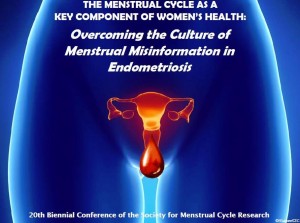Worldwide, and here at re:Cycling, March is #EndometriosisAwarenessMonth. To increase your knowledge of this insidious disease, read through this series of articles and personal stories, briefly quoted here, that were published by The Guardian last September.
Sep. 27, 2015, The Guardian, What is endometriosis guide
Endometriosis is a condition in which tissue similar to the lining of the uterus (the endometrium) is found outside the uterus, most commonly in the pelvic cavity.
It can grow on organs including the ovaries, uterus, bowel and pelvic sidewall, causing inflammation and pain.
Sep. 27, 2015, Gabrielle Jackson, The Guardian, Endometriosis: 20 things every woman (and every doctor) should know
11.
Endometriosis affects the immune system but it isn’t an autoimmune disease.12.
The severity of endometriosis doesn’t necessarily correlate with the amount of pain or other symptoms a women has.
Sep. 27, 2015, Gabrielle Jackson, The Guardian, I’m not a hypochondriac. I have a disease. All these things that are wrong with me are real, they are endometriosis
I feel sad that this is the hardest story I’ve ever written and that I’m embarrassed that people will read it and know the intimate details of my life. But I’m also hopeful that a conversation has begun.
Sep. 27, 2015, Sarah Boseley, Jessica Glenza and Helen Davidson, The Guardian, Endometriosis: the hidden suffering of millions of women revealed
The lack of research and funding for a disease that affects so many women is “a major scandal”, said Lone Hummelshoj, who heads the World Endometriosis Research Foundation and the World Endometriosis Society.
“Endometriosis affects women in the prime of their life. It is not a lifestyle disease. It is not a disease you get later in life. It attacks teens, young women when they should be out being active, working, having children, having sex – 50% of them are struggling with sex because it is too painful,” she said.
Sep.28, 2015, The Guardian view on endometriosis: a silent source of unnecessary misery–Editorial
A disease that affects one in 10 women of childbearing age, that forces young girls to take days off school, older women to abandon careers and condemns others to childlessness should not be near-invisible. And yet endometriosis is rarely discussed, and when it is, it is often obscured by myths suggesting that women themselves are in some way to blame. Many are ashamed to admit to suffering, and often doctors seem ill-prepared to diagnose and treat the disease. It is a secret plague; yet it could afflict as many as 176 million women around the world.
Sep. 28, 2015, Hilary Mantel, The Guardian, Endometriosis took my fertility, and part of my self
My own battle with the disorder seems to have occupied most of my life. Period pains were normal, I was told, and if I seemed to suffer more than most, it must be because I had a “low pain threshold”. At 19, I began actively seeking a diagnosis. I was 27 when I received it, and by that stage, major surgery was the only answer. Abruptly I lost my fertility and, in some ways, lost myself. Though I was told I was cured, the condition recurred, and drug treatment led to huge weight gain. Thyroid failure followed and the devastating chain of consequences pursues me to this day. Anything I have achieved has been in the teeth of the disease.
Sep. 28, 2015, The Guardian, ‘The pain is paralysing’: 30 women describe living with endometriosis
I’m a gynaecologist and I didn’t want to accept that I had it
It’s treated like some shameful secret
Endometriosis is ruining my marriage
Doctors who know how to treat it are few and far between
Sep. 28, 2015, Jessica Glenza, The Guardian, Endometriosis often ignored as millions of American women suffer
Many patients and specialists contend that the lack of research funding and public knowledge of endometriosis is because of who and what it impacts: almost exclusively women, largely during menstruation.
“I went 10 years, through 22 surgeries, before I got help,” said Heather C Guidone, the surgical program director at the Center for Endometriosis Care in Atlanta. Through those 10 years, and since hearing the stories of other patients, she said doctors often tell women, “‘Periods are supposed to hurt. It’s a woman’s lot in life to suffer.’”


